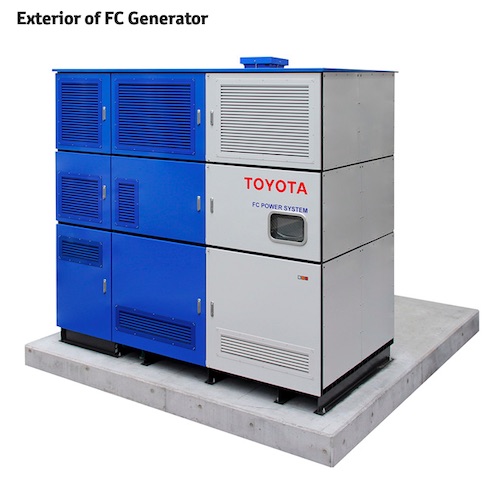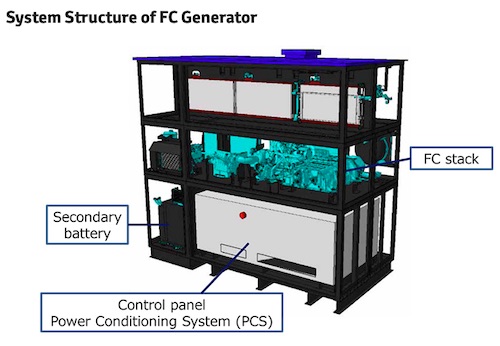Tokuyama and Toyota Start Verification Tests in Japan for Stationary Fuel Cell Generator that Uses By-product Hydrogen
- Written by ACN Newswire - Press Releases
|
|
|
|
|
|
By using components from the Mirai FC system, such as the FC stack, power control unit (PCU), and secondary battery, Toyota seeks to produce a high-performance generator at a reasonable price. Development on the FC generator was carried out jointly by Toyota and Toyota Energy Solutions, Inc.
The newly introduced FC generator is based on the FC generator with a rated output of 100 kilowatts that have undergone verification tests since September 2019 at Toyota's Honsha Plant grounds in Toyota City, Aichi Prefecture. The rated output has been changed to 50 kilowatts, and other enhancements have been made, such as adjusting the component layout to improve maintenance.
Basic Specifications of FC Generator
Width x Depth x Height: 2.9 x 1.5 x 2.7 mWeight: Approximately 3.5 tonsMain FC systems taken from the Mirai: FC stack, PCU, secondary battery, air compressorRated output: 50 kWPower generation efficiency (transmission end): Goal of 50 percent or moreRated voltage / number of phases / frequency: AC 210 V / three-phase three-wire / 50/60 HzFuel cell type: Solid polymer electrolyteHydrogen purity: Pure hydrogen (99.97 percent)Start-up time: 40 seconds (time to reach rated output)
A feature of the new tests is the use of hydrogen generated as a by-product in the manufacture of sodium hydroxide by Tokuyama, using the chloralkali process as fuel for the FC generator.
Tokuyama will be responsible for the steady supply of by-product hydrogen, and the electricity produced by the FC generator will be supplied to the Tokuyama Factory at a rated output of 50 kilowatts.
Toyota will verify and evaluate aspects including energy efficiency--the amount of electricity generated per unit of hydrogen--the stability of the generated output, durability, ease of maintenance of the generator, and the impact of salt-air damage from the sea breezes. In addition, the tests will be used to estimate the impact on power generation from the use of by-product hydrogen, and the economics of this in comparison with purchasing from an external source.
Moving forward, Tokuyama will consider a business model, which contributes to the local community, as one of the leading Japanese comprehensive chemical manufacturers with the capacity to supply highly pure by-product hydrogen. In order to expand use of the FC generator, Toyota will consider research and development, and business models for improving the generator's product appeal, through the expansion of the FC generator output lineup, and by enhancing its energy efficiency and durability, making it more compact, and reducing costs.
Through these tests, Tokuyama and Toyota will further advance efforts aimed at the realization of a hydrogen society.
About Toyota Motor Corporation
Toyota Motor Corporation (TMC) is the global mobility company that introduced the Prius hybrid-electric car in 1997 and the first mass-produced fuel cell sedan, Mirai, in 2014. Headquartered in Toyota City, Japan, Toyota has been making cars since 1937. Today, Toyota proudly employs 370,000 employees in communities around the world. Together, they build around 10 million vehicles per year in 29 countries, from mainstream cars and premium vehicles to mini-vehicles and commercial trucks, and sell them in more than 170 countries under the brands Toyota, Lexus, Daihatsu and Hino. For more information, please visit www.toyota-global.com.
Copyright 2020 JCN Newswire. All rights reserved. www.jcnnewswire.com
Authors: ACN Newswire - Press Releases
Read more //?#




